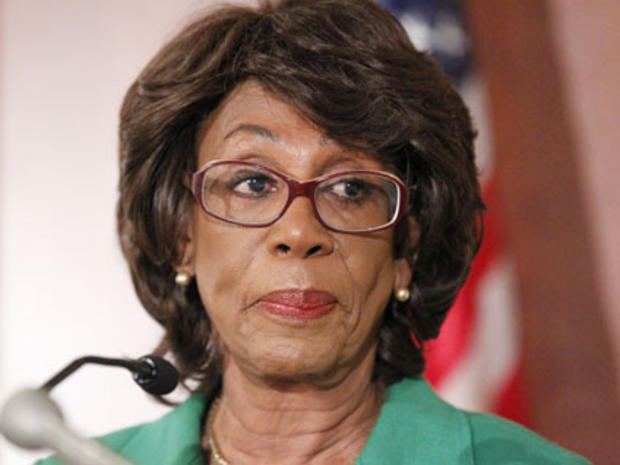Maxine Waters Mounts Her Defense Against Ethics Charges
Friday mornings during August recess are usually a quiet time on Capitol Hill. Members are back in their districts and there's usually little news to cover. They are generally a good time to update contacts, meet staffers for coffee or just leisurely read through the morning papers.
But this August is different.
Not only are there midterms elections this year that could switch control of the House, but there are two very public ethics trials pending when Congress returns in September: One for Rep. Charles Rangel (D-N.Y.) who is facing 13 counts of violating House ethics rules and code, and another for Rep. Maxine Waters (D-Calif.) who is facing three charges for arranging a meeting for minority-owned bank OneUnited with Treasury Department Officials at the height of the financial crisis in September 2008. Her husband is a former OneUnited Board member and still held stock in the company at the time.
Rangel's been the media's major focus so far. He doesn't try to avoid cameras staked out at his office for weeks. And he even went to the floor of the House to plead his case to fellow members on Tuesday. Waters has largely avoided the national press until now.
OneUnited would eventually get $12 million in TARP funding. The question is whether Waters inappropriately facilitated that.
Waters and her Chief of Staff Mikael Moore, who is also her grandson, laid out their defense to reporters this morning for nearly two hours. It largely centered around the timing of TARP, which was signed into law on October 3, 2008. Moore also gave a power point presentation with e-mails, testimony and memos backing up their claim that no one, not the congresswoman nor anyone on her staff, acted improperly. And Waters took numerous questions from reporters, even letting some of us ask more than one.
"I have not violated any House rules," Waters declared in her opening statement, clearly a bit nervous and distracted by all the clicking photographers. She eventually asked the cameras to step back because the flashes were bothering her eyes.
Waters insisted that she did not facilitate a meeting specifically for OneUnited with Treasury. Two executives from OneUnited asked Waters to arrange the meeting: OneUnited CEO Kevin Cohee and Robert Cooper, senior counsel at OneUnited who was at the time chair-elect of the National Bankers Association (NBA), a trade association representing women and minority-owned banks.
When Waters called then-Treasury Secretary Hank Paulson, she requested the meeting for the NBA to discuss losses resulting from the Federal government taking Fannie Mae and Freddie Mac into conservatorship -- not specifically for OneUnited.
"The question at this point should not be why I called Secretary Paulson, but why I had to," Waters said this morning. "The question at this point should be why a trade association representing over 100 minority banks could not get a meeting at the height of the crisis."
Paulson granted the NBA a meeting with senior Treasury officials on September 9, 2008. Cohee also attended and asked for $50 million to make up for OneUnited's losses. According to the House ethics committee's Statement of Alleged Violations on Waters, no other banks or NBA members were at the meeting. Treasury denied the request, saying they did not have the legal authority to grant that money.
While that initial request for money was denied, OneUnited would eventually receive $12 million from the Troubled Asset Relief Program (TARP) at the height of the financial crisis. Waters claims that she extricated herself, and her staff, from TARP discussions relating to OneUnited. Waters said that she told Chairman of the House Financial Services Committee Barney Frank to handle it because she knew she should not be involved in helping OneUnited specifically. Waters maintains that this conversation took place after the meeting with NBA at Treasury, but Frank says he can't remember the exact date.
Waters said the most compelling evidence in her favor is that "no one in any regulatory agency, the FDIC, the Treasury, no one has said that Maxine Waters or her chief of staff called them, wrote them, asked them to do anything."
She points to emails from then-head of the TARP, Neel Kashkari, saying that he was not even aware of the September meeting between Cooper, Cohee and treasury officials. Another TARP staffer said that the bank received the money because it adequately met the criteria to be eligible for TARP funding.
Waters also expressed frustration with the slow pace of the House ethics committee.
"I think any member who finds him or herself in this situation would have it better off to have it resolved as quickly as possible, that if there is to be a hearing, it should be done, and the facts should come out and the decision should be made," Waters said. "So I think it's important for due process to take place. It's kind of guaranteed by something called the Constitution.
Waters said she wants to move forward with the hearing as soon as possible to make her case that all she did was arrange a meeting at Treasury for a trade association, that TARP was not in existence at the time, and that there's no evidence that she did anything to help OneUnited get TARP money. She asked reporters and the public to look at her entire career and see that she's always been a champion for minority-owned businesses who struggle to get access to the big decision makers.
The ethics committee has not set hearing dates yet for Waters or Rangel.

